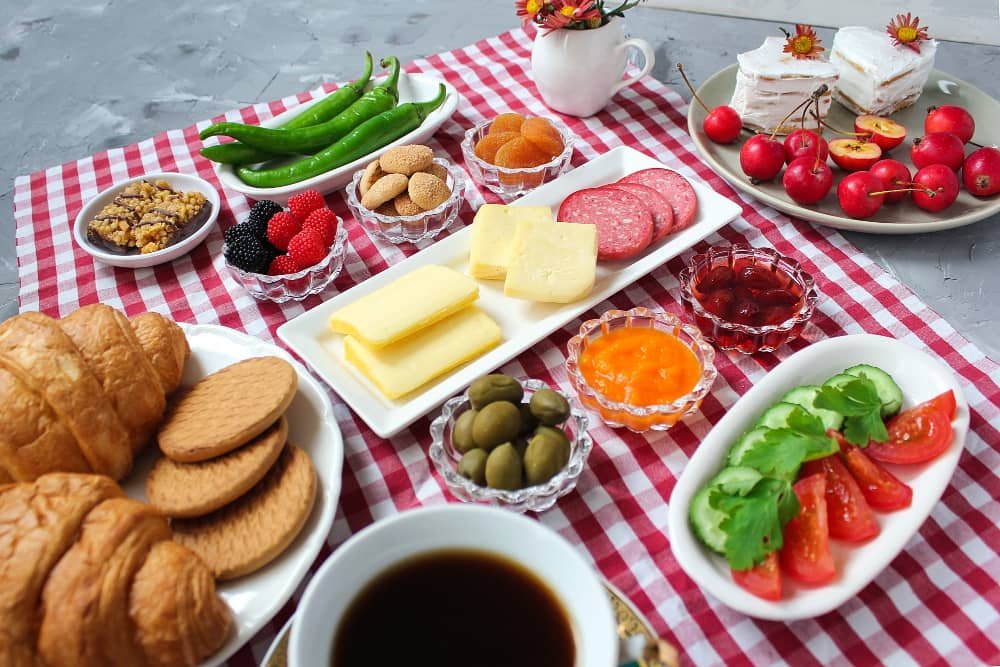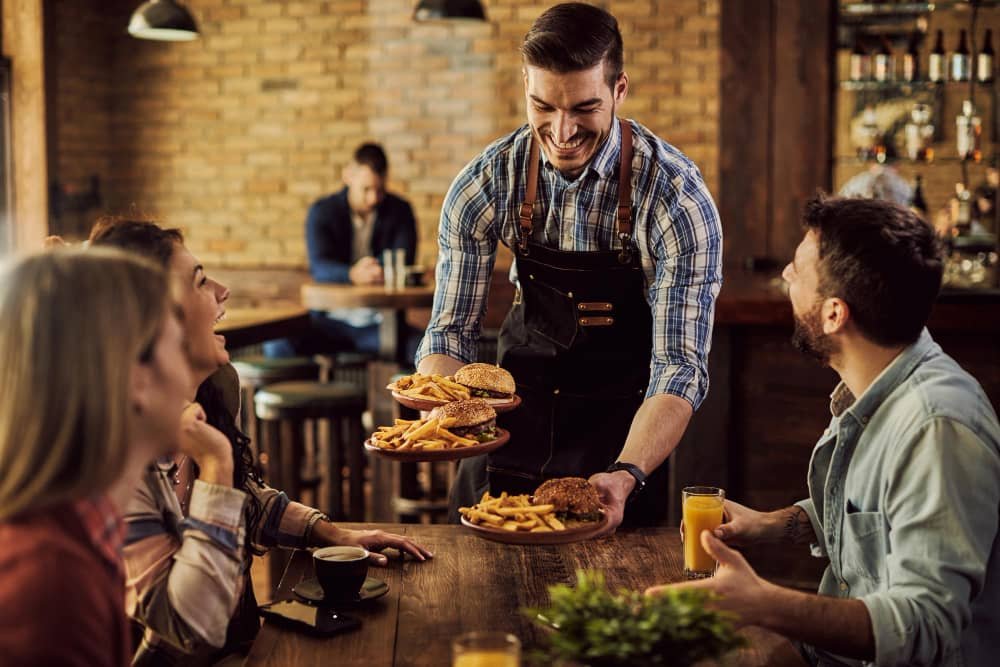Avoiding eating late at night while traveling can be important as it disrupts your body’s natural circadian rhythm and sleep cycle, adversely affecting your physical health and mental wellbeing.
Food is symbolic of love when words are inadequate.
Alan D. Wolfelt
Studies have shown that individuals who eat late at night consume higher amounts of fatty and sugary foods than those who eat earlier in the day. This could potentially lead to weight gain and increased risk for diseases such as diabetes or heart disease.
Tips for Avoiding Eating Late at Night While Traveling
Traveling in the Balkans can be an excellent opportunity to explore some of the world’s most beautiful and historic sites, but it can also be a challenge to maintain a healthy diet. Eating late at night is one of the biggest challenges when trying to keep up with a healthy diet while traveling in this part of the world. Here are some tips for avoiding eating late at night while traveling.

Make sure to eat a big breakfast
Traveling in the Balkans can be an exciting and rewarding experience. However, taking certain precautions is essential to ensure your trip goes as smoothly as possible. One of the most crucial tips for travelers visiting the Balkans is to provide you with a big breakfast. This will help keep you full throughout the day and make you less likely to snack later. It will also help to avoid eating late at night while traveling.
When visiting the Balkans, it is common for locals to stay up late into the night, so finding food after 10 pm can be difficult. Eating a large breakfast each morning will give you enough energy to last until dinner without feeling too hungry or tempted by unhealthy snacks late at night. Eating a balanced meal full of protein and healthy carbohydrates will also provide essential nutrients often missed during long days of travel or sightseeing.
Plan Your Meals Ahead of Time
If you know, you will be out and about all day, pack a lunch or snacks so you don’t have to buy something unhealthy when hunger strikes.
When traveling in the Balkans, planning meals is essential to avoid eating late at night. Eating late at night can disrupt your sleep schedule and cause fatigue the next day. Planning your meals will help you stay on track with your diet goals while ensuring proper nutrition.
It is best to plan healthy snacks and meals so you are not tempted by unhealthy options when hunger strikes. Pack nutritious snacks such as nuts, fruits, vegetables, or protein bars when you can’t find a restaurant or grocery store nearby. Additionally, if you know where you will be staying during your travels, consider researching local restaurants and grocery stores to understand what is available in the area. This will help ensure that when mealtime comes around, healthy options are available for consumption.

Avoid Restaurants and Bars
These places are often open late and can tempt you to order unhealthy foods or drinks.
When traveling around the Balkans, you should know the local customs and practices regarding meal times. Eating late at night in restaurants or bars is not recommended if you want to avoid overeating food and potentially putting on weight. It is important to note that people in the Balkans tend to eat their dinner earlier than in other parts of Europe and North America, so going out for a late supper may not be ideal.
The best way to avoid eating too late at night while traveling through the Balkans is to avoid restaurants and bars after 8 p.m., which is generally considered too late for dining out. Instead, opt for lighter snacks from local grocery stores or markets during this time frame—such as salads, fruits, or nuts—which can help keep hunger pangs at bay until breakfast the following day.

Eat Dinner Early
Traveling in the Balkans can be a great experience, but staying healthy on the road can also be challenging. Eating dinner early is one way to maintain good dietary habits while visiting this region. Eating earlier can help travelers avoid eating late at night, associated with health risks such as weight gain and poor sleeping habits.
When traveling in the Balkans, visitors should try to have their main meal before 7:00 p.m. so they have time to digest before going to bed. This will allow them time to digest before going to sleep while providing them with energy for exploring during daylight hours. For those unable or unwilling to adhere strictly to this timetable, snacks throughout the day may help reduce cravings for unhealthy late-night meals.
Stay Away from Tempting Foods
If you know there is food you can’t resist, don’t keep it in your house or pack it when traveling. Out of sight, out of mind!
Those looking to maintain a healthy diet and lifestyle may find it difficult to resist the alluring temptation of local cuisine. To ensure you don’t succumb to late-night snacking while traveling in this part of the world, here are a few tips on how to stay away from tempting foods.
Firstly, plan your meals and stick to them during your travels. Eating regularly throughout the day will help manage cravings and keep you feeling full until bedtime. Secondly, if you feel tempted by local snacks or restaurants, try keeping unhealthy items out of sight when shopping for groceries or eating out at restaurants. Thirdly, always keep nutritious snacks, such as nuts or fruits, that can tide over hunger pangs until your next meal.
I watch cooking change the cook, just as it transforms the food.
Laura Esquivel

Drink Plenty of Water
Traveling in the Balkans can be a wonderful experience, with its stunning view and unique culture. However, avoiding eating late at night while traveling in this region is usually challenging for many tourists. Staying hydrated is one of the best ways to tackle this issue and keep hunger pangs away during travel. This will help to Fill you up and prevent late-night snacking.
Water is essential in regulating our hunger hormones and reducing cravings for unhealthy snacks or late-night meals. Keeping your body hydrated also helps to reduce bloating, which can make you feel full longer, allowing you to resist the temptations that come with sightseeing after sunset. Drinking plenty of water throughout the day will help maintain the proper digestion and absorption process functioning, thus leading to fewer cravings at night.
Avoid Caffeine after 2pm
Caffeine can make it harder to fall asleep at night, so avoiding it in the evening is best.
It’s essential to maintain healthy eating habits while abroad. To ensure you don’t overeat late at night, experts recommend avoiding caffeine after 2 p.m. Caffeine stimulates the body, leading to cravings for unhealthy snacks and drinks late at night.
Additionally, caffeine can disrupt sleep patterns when consumed too close to bedtime. When your body is deprived of restful sleep, it will naturally seek food for energy in the evening when other energy sources are unavailable or easily accessible. Eating late at night can cause weight gain and digestive issues due to consuming large amounts of food before the digestive system has had time to process food consumed earlier in the day.

Get Enough Sleep
This is one of the most important things you can do for your health and will also help prevent late-night cravings. For those who want to avoid eating late at night while traveling, it’s essential to ensure you get enough sleep. A good night’s rest will help keep your body balanced and give you the energy you need for a successful journey.
It can be not easy to find time for sleep when there are so many exciting sites to see, activities to do, and delicious meals to enjoy. To help ensure that your body gets enough rest, try creating a schedule or itinerary that includes ample breaks throughout the day and an early bedtime. Aiming for 6-8 hours of sleep each night is ideal while on vacation to stay rested and energized throughout your travels.
Exercise Regularly
Exercise can help boost your metabolism and reduce stress, leading to healthier eating habits. Avoid eating late at night, which can be challenging when you’re out exploring and sightseeing all day. Try exercising regularly while traveling in the Balkans to help combat this issue and stay on track with your diet. Exercise is a great way to boost energy levels and stay healthy throughout your travels.
Exercising for just 30 minutes a day will have numerous benefits during your trip. It will help keep you energized throughout the day instead of exhausted from running around or sitting in cars or buses for hours. Regular exercise also keeps you feeling full longer, meaning that late-night cravings won’t take over as quickly! Plus, it gives you an excuse to explore new places and get familiar with the local terrain – something that only adds to your travel experience!
Be Mindful of Your Portion Sizes
It’s easy to overeat when we’re not paying attention, so try to be aware of how much food you consume throughout the day. One of the biggest challenges for travelers is managing portion sizes and avoiding late-night snacking. Paying attention to your portions when traveling in this region is essential to ensure that you get enough nutrients and energy throughout the day.
Portion control is vital when maintaining a healthy diet while on the go. Eating more significant portions than usual can lead to overeating—especially if you’re out late at night and away from home. It’s easy to forget how much food you’ve already eaten during a long day of sightseeing or exploring new cities, so tracking your portions and taking breaks between meals is essential. Additionally, opting for smaller plates or bowls helps ensure you don’t overindulge on any meal.
Final Words
Travelers must know local customs when dining late at night when heading out for dinner. Local cuisines are often heavy with breads and meats, making them difficult to digest late at night. Additionally, some areas may have limited food options after 8 p.m. due to small-town closing hours.





